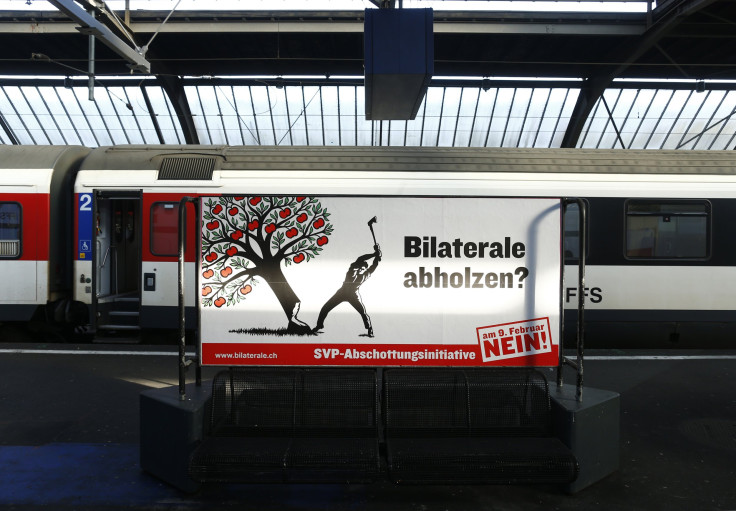Swiss Vote To End Open Immigration Pact With European Union (EU)

Update 5:30 p.m. EST: Reacting to the vote, Swiss Justice Minister Simonetta Sommaruga said, "This is a turning point, a change of system with far- reaching consequences for Switzerland," Reuters reported.
The European Commission in Brussels said in a statement that the vote went against the principle of free movement of people. It said it would examine the implications for its relations with Switzerland, taking into account the position of the government, which had urged citizens, to no avail, to vote no.
"For us, EU-Swiss relations come as a package," said Hannes Swoboda, a member of the European Parliament. "If Switzerland suspends immigration from the EU, it will not be able to count on all the economic and trade benefits it is currently enjoying. We will not allow ... cherry-picking."
Original story:
Swiss voters apparently have restored strict immigration quotas, ending a pact with the European Union, returns showed Sunday.
In a referendum, about 50.3 percent voted in favor of ending the Swiss-EU pact on free movement of people, Swiss TV reported.
While neutral Switzerland is not a member of the EU, its immigration policy is based on free movement of people to and from the EU, as well as allowing in a restricted number of non-EU citizens.
The vote, which comes 12 years after an agreement with the EU on free movement of people came into force, could hurt an economy dependent on foreign professionals by increasing red tape and jeopardizing bilateral accords, Reuters notes.
Just over half of voters backed the so-called "Stop mass immigration" initiative, which also won the required majority approval in more than half of Swiss cantons or regions, Swiss television said. The outcome obliges the government to make the initiative, spearheaded by the right-wing Swiss People's Party (SVP), into law.
It reflects growing concern among the Swiss population that immigrants are eroding the nation's distinctive Alpine culture and contributing to rising rents, crowded transport and more crime.
Opponents of the move say it could exacerbate a shortage of skilled workers the country, which is home to Roche, Novartis, UBS, Nestle and other multinationals filled with foreign professionals.
"Explanatory and constructive talks with the EU are needed urgently," the Swiss Banking Association tweeted after the result.
The union has already warned the Swiss that they cannot just choose the aspects they like.
French-speaking areas largely opposed the quotas, German-speaking regions were divided, and the Italian-speaking canton of Ticino was strongly in favor.
Switzerland's economy is booming, and unemployment is low, but many Swiss worry about immigration. A quarter of the population is of foreign origin, and last year 80,000 new immigrants arrived.
Since 2007, most of the EU's 500 million residents have been on an equal footing with locals in the Swiss job market - the result of a policy voted into law in a 2000 referendum.
© Copyright IBTimes 2025. All rights reserved.



















